 How do you challenge a novel that mainstream judgement considers an icon? How do you say: “It’s not so hot.” or “The idol is hollow.” Imagine the publishing world and the marketing world were in their own galaxy. If you ask those questions, you leave that galaxy behind.
How do you challenge a novel that mainstream judgement considers an icon? How do you say: “It’s not so hot.” or “The idol is hollow.” Imagine the publishing world and the marketing world were in their own galaxy. If you ask those questions, you leave that galaxy behind.
The novel is Uncle Tom’s Cabin. Moral outrage on the subject of slavery: “This is perfectly horrible!” she exclaims. “You ought to be ashamed of yourselves.”
Incontestable…Baldwin notes, but then he startles by comparing the sentiment to improving mottoes that can be found on the walls of furnished rooms. In our social media parlance, we would say that Baldwin is being snarky.
What’s eating Baldwin? We “invariably” flinch before such mottoes. A lot of people don’t, of course. They put them up on their walls.
“…recognizing an insupportable. almost indecent glibness…” The outrage in Uncle Tom’s Cabin is incontestable but the way it is expressed has “an insupportable, an almost indecent glibness.”
I want help with “glibness”. Searching for examples, I was thinking of television, but not all of it. Music, but not all of it. Everyday conversation, but not all of it.
Baldwin throws me a lifeline with a segue to sentimentality. “Sentimentality”…here’s an online definition, the best I found, from Wikipedia: “originally indicated the reliance on feelings as a guide to truth, but current usage defines it as an appeal to shallow, uncomplicated emotions at the expense of reason.”
Here’s Baldwin on sentimentality: “…the ostentatious parading of excessive and spurious emotion, the mark of dishonesty, the inability to feel…fear of life…aversion to experience…arid heart…secret and violent inhumanity, the mask of cruelty.”
Stowe’s failure is her failure as a novelist to speak complex revelatory truths about character. Double sense of character: the character of our lives and the character of individuals. Stowe sloganeers a condemnation of slavery but doesn’t ask where the hate is coming from. And she stays inside the box of the conventional pieties of her time. Define conventionality this way: “I’m not leaving the cage door open.” Was that the state of Stowe’s literature then…and of how much literature now?
Protest is engendered, then comes the move to co-opt it. Protest is allowed but only under a framework that mitigates its message. Its energy is redirected to strengthen the cage. We aren’t led, we’re managed.
The novelist’s truth seems like a wild native creature if it has Baldwin’s sense of it. It can’t be penned in. It can’t be domesticated. It can’t be a bird in a cage or a fish in a bowl of water. Pen it up and you have innervated it, possibly killed it. The truth of ourselves is untamed or it is diminished. Truth is feral.
“…the disquieting complexity of ourselves–we are diminished and we perish; only within this web of ambiguity, paradox, this hunger, danger, darkness, can we find at once ourselves and the power that will free us from ourselves.”
I want to run away from everything confining when I read phrases like this…from attempts to tamper down our “disquieting complexity”. From the Causes (large cap) that, as Baldwin says, are notoriously bloodthirsty.
I decided to read some James Baldwin as a literary antidote to recent events in Ferguson. To find some clarity by reading a wise writer. What I learned is that a false clarity is worse than a real complexity. That anything that uses you diminishes you…and anyone who uses you diminishes you. Even if the cause is just, cant in the service of a good cause is still cant and cant is a betrayer…and it makes for some pretty lousy literature.
We can’t get over the irreducible tension and confusion of being ourselves. That can’t be quantified, which is an impertinent thing to say in our age of big data and of insufferably positive book reviews, including my own.
We should decline to be managed if that means denying the complexity of our personal struggles. And we should continue to explore, avoiding pat or mawkish pseudo-solutions that try to shut us down. We should stay mad, independent, wild. Say “no thanks” to the perpetual invitation to be domesticated, to become “safe”. Safe for whom?
Read this essay, which I found in my bought copy of the Library of America Essays, and see what you can find in it.







